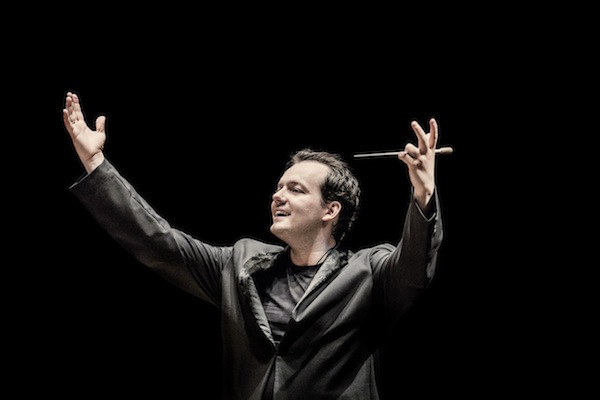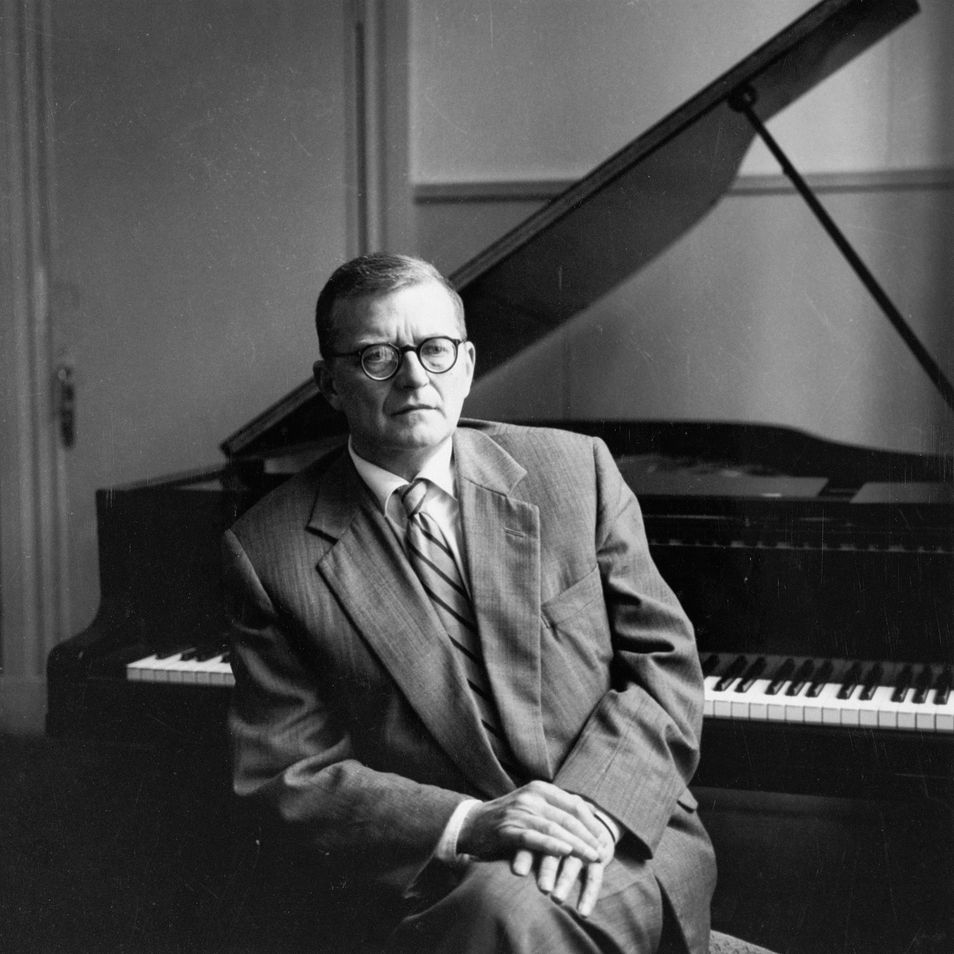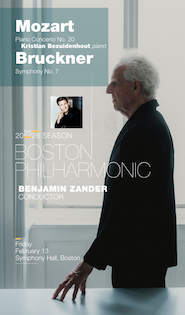Shostakovich and flow: Andris Nelsons talks about the Russian composer, and his growing bond with BSO musicians

Andris Nelsons conducts the Boston Symphony Orchestra in music of Kancheli, Rachmaninoff and Shostakovich this week. Photo: Marco Borggreve
The music director’s office in Symphony Hall is a plain, high-ceilinged room with one window overlooking St. Stephen Street, a grand piano, and a few places to sit. It has not been redecorated in quite a while; in fact, it’s not hard to imagine a tweed-jacketed, bow-tied Serge Koussevitzky adjusting the heavy drapes and having a seat in one of the small armchairs to receive a visitor.
On a Wednesday afternoon last fall, however, it was a track-suited Andris Nelsons, hair mussed and face shiny from rehearsing the Boston Symphony Orchestra, who folded his large frame into that armchair, then looked ready to spring out of it any minute as he mused aloud on composers and music-making, in his new adopted language.
Nelsons’ English has improved rapidly since his appointment as BSO music director, and now when he gets going on a subject that interests him it’s hard to fit a question in edgewise. He talked about the current season, his second in the BSO post, with its three weeks devoted to music inspired by Shakespeare, his season-long project to program and record music by Shostakovich, his philosophy of conducting, and his developing relationship with the orchestra.
At the time of the interview, the orchestra’s first European tour was a fresh chapter in that story. “After that first season, and after the tour, and now,” Nelsons said, “every concert, every program, every moment we are together, it develops more and more closely the relationship—in musical understanding, and also human understanding of the character of an orchestra and each individual.”
The maestro’s contract as music director had just been extended by the orchestra from five years to eight. “I’m really very honored that it will go at least till ’22, because that relationship has been growing each moment,” he said. “We know we are on the same train, you know? To me, it goes to respect, and to trying to capture the tradition that the orchestra has, and it’s a huge tradition, and to bring what my subjective attitude to performing music is. But it’s not [about] what I want, it’s what I subjectively think the composers wanted to express through their music.
“Years ago I conducted like, ‘I want you to play this, and I want you to play this,’ because of my ego. That way doesn’t work, and I think it’s just an absolutely wrong way for expressing honestly and deeply what the composer wants to express.
“I still think the communication with music, and with the orchestra, mostly happens in the rehearsal, but actually the miracle, or the mystical part, happens in the concert. And that happens through this kind of, you know, energy flow–what I pass through my hands and toes and through my body. And still, every individual [in the orchestra] is a great musician, and everyone has maybe a little different approach to what that means, and it all creates this great variety of sound and direction.
“Of course, there is a lot of discipline required. Von Karajan said, ‘In two places there is no democracy: the army and music.’ I agree, in the sense that the dictatorship comes from the composer.”
Nelsons said he tries to guard against novelty for novelty’s sake in interpretation. “If you try to be different, thinking, ‘OK, so, I should be different, because otherwise people will think I’m not interesting,’ you will never be honest, you will never dig deep with the composer.”
Although he believes that “it’s good to know and to learn from a tradition,” he cautions against being a slave to tradition as well. “The Boston Symphony Orchestra is a hundred and thirty-five years old. If you go to a museum, where [what you see] would be made about a hundred and thirty years ago, you enjoy that and you learn, but it gives a different kind of satisfaction and food for the brain.
“At each concert we try to play, and to deliver, and to be alive in the present, and to do that, we need constantly to be fresh, and naïve, as if the piece was composed just now, and it’s the first time we’re playing it.”
Starting Thursday, Nelson’s ongoing exploration of Shostakovich continues with the Eighth Symphony. The conductor reflected on the composer’s dilemma during the Stalin years: “He was a very good citizen, very patriotic, in a healthy way. He was not, in that sense, interested in politics, he was just a very fine, intelligent person who lived in the Soviet Union.
“The biggest shock to him as an artist and as a person was this article in Pravda which appeared after Stalin had seen [his opera] Lady Macbeth of Mtsensk. Obviously some people spoke to Stalin and said, you should see this, it’s very dark music, and there’s something wrong there.
“He went, and he left in the middle of the opera, and the next morning there appeared this article where suddenly Shostakovich went from the most talented, most popular of musicians, to the enemy of the socialist regime.
“And from that moment I think all his symphonies, even the Seventh, which he wrote for Leningrad, were against Stalin. Somebody says, no, the Seventh is against the Nazi invasion, but I think it’s a combined thing—he was against violence when it happens in any country. He was just very hurt by this insult of Stalin, and then he started to say, OK, to survive as an artist, he needed to find his way of still presenting his emotionality and his inner world of expression in the music.
“The journey in these symphonies, from Five to Ten, is so interesting to see. In the Fifth Symphony, he finally composed a piece which is glorifying Stalin, but there’s a double meaning—they got what they wanted, but it’s not really a victory for the regime. And they found the Sixth Symphony, first movement, really disappointing—they said, ‘How can you write such [sad] music when everything is going so well?’
“At that time, there were these documentary films with the workers so happy and smiling! And so anybody who was involved in art where the masses were represented, including composers, were forced to write music that would support that vision, while next to those smiling faces there were thousands and thousands killed.
“Meanwhile, Shostakovich was interested in Mahler, in knowing what was happening in the world as much as he could. He was interested in [new] composition techniques, and you see the influence of Mahler in his symphonies.
“It’s so ingenious how he found a way to survive as an artist and to compose these amazing symphonies and other pieces, during a period when Stalin was still alive, Stalin who thought his music was all wrong. What he found was a huge dose of sarcasm, irony, the grotesque, or false pathos, or false triumph in these symphonies.
“The censors hear this”—Nelsons sang a fast, dancy tune—“and they can’t say that’s depressing, or that’s unhappy. In this great way of humor and sarcasm, he managed to present in his music exactly what happened in his time, but still survived that regime.
“There were so many moments in his life when he thought he would be sent out or killed, because when they called you to that office, it meant you were going to be deported. Everyone had their suitcases ready at home. You were ready to die or be deported any minute—that’s the atmosphere he was living in.
“It’s so interesting to see the video in the archive, where he’s making a speech to the Congress of Composers and saying, oh yes, we are fighting for the brave communistic ideal and so forth. He was saying the words and not thinking–he was given the speech [to deliver]. And you see him talking and saying nothing, but in his symphonies, particularly in this time, everything is there.”
Invited to recall his first encounters with Shostakovich’s music, Nelsons replied, “In my childhood, his symphonies were played regularly in concerts. The Fifth was often done, and the Seventh, and the Fifteenth. At a very, very young age, it was difficult to understand. It sounded quite contemporary. For a young child who didn’t know the political or the historical background, your parents wouldn’t tell you, because it was dangerous to talk about these things.
“So you realize it’s very dramatic, and sometimes very dissonant, and sometimes very happy. Then later, when I realized what he has gone through, I connected more and more and more, and I opened up a door to his music. And then you see that everything he writes is genius music. Even the film music for movies glorifying Stalin—that is great music! If you don’t know what Stalin did, you are thinking, here’s this man who will take care of you.
“But at the same time, Shostakovich is writing the Eighth Symphony and many string quartets, where you see into his soul.”
Nelsons warned against obsessing over Stalin when listening to Shostakovich’s music. “It’s genius music in terms of its composition, its use of instruments and colors. Although it’s presenting the time when he lived and his attitude towards life, his protest and all the feelings he had, he’s also talking about his problems in a very global way, so when you listen to Shostakovich now it’s not just one political thing. It also speaks to the world now, with different strange things in many different countries.”
At the time of the interview, Divisions by the American composer Sebastian Currier, a BSO commission with two other orchestras, had just enjoyed a well-received Boston premiere under Nelsons’s baton. Was there more contemporary music by Americans on the way?
After pausing to pay tribute to the late Gunther Schuller (“such a great personality…I am so happy I got to know him and play his music”), Nelsons went on to praise George Tsontakis, whose Sonnets for English horn and orchestra received a warm reception at its world premiere this past February, before pivoting to what he called “classical American,” meaning the likes of Barber and Copland.
In addition to Barber’s Essay No. 2—which he called “a valuable piece, just thirteen minutes, but excellent”—he also recalled conducting “some pieces by Gershwin in Riga. American in Paris, Rhapsody in Blue, the Concerto—I love those pieces, and I’d like to come back here and perform them, but it will take some courage!”
He noted that things have changed since composers of different persuasions used to fight over tiny scraps of concert-hall turf. “Now we have the huge development of technology and the accessibility of everything, and nobody would say this is too avant-garde, or that is too conservative—there’s so much music in any of these directions.
“For me as a musician, it’s very confusing, because there’s so much music composed today, and we have a great responsibility to perform the pieces. Sometimes it’s difficult at first sight, when you have three hundred scores, to realize which one you should play.
“I think it’s most important to find the composers who capture what they feel about life today. We have these Shostakoviches and these Coplands, and now after a hundred years or fifty years, we can ask, what did they feel, what did they think about, when they [composed]? We can read in books about how it was then, but we have this music to listen to also.
“Some composers are more interested in composition itself, just to find a different technique, which is also interesting, but [I want to know] how does it express what’s happening in life? Contemporary music, in that sense, to me is very important.”
Andris Nelsons conducts the BSO in works of Kancheli, Rachmaninoff, and Shostakovich 8 p.m. Thursday and Saturday and 1:30 p.m. Friday. bso.org; 617-266-1200.
Posted in Articles





